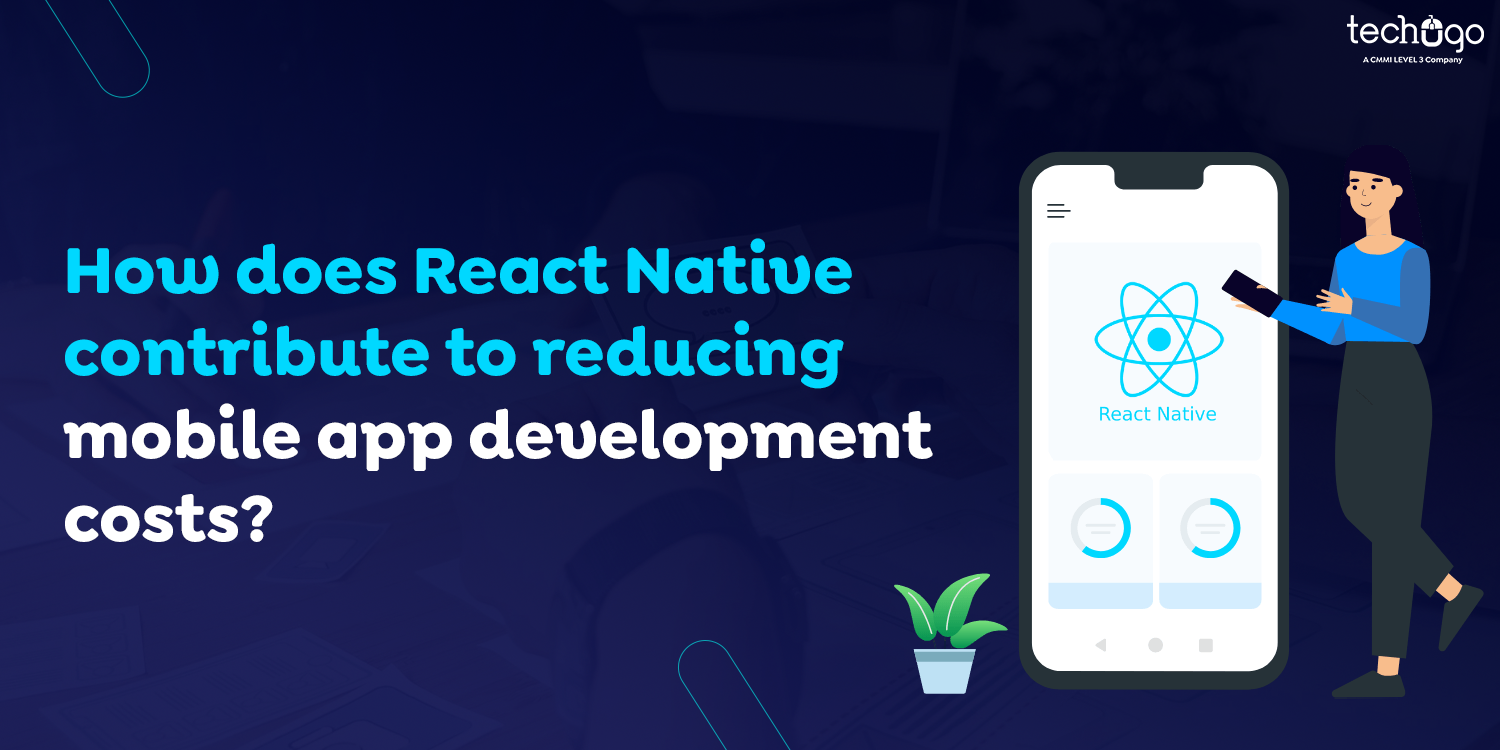7 May 2024
Updated on January 28th, 2025
How does React Native contribute to reducing mobile app development costs?
Matthew Connor

As we all know, numerous new ventures emerge daily worldwide because we are extensively exposed to social media. There exist hundreds of millions of them, and the only means these startups circumvent this is if they possess an exceptional mobile application that is incredibly favoured by users.
Nevertheless, the Google Play Store has only about 2.6 million applications, and as previously stated, there are hundreds of millions of enterprises. So, what is preventing these figures from aligning?
Naturally, startups possess a significant demand for mobile applications, but owing to the exorbitant expenses linked with developing them, there is minimal notion of follow-through. It’s crucial to know the React Native development costs so that it can aid more startups in their visions. Additionally, the support from a React Native app development company in Canada can help enterprises meet their requirements. So, let’s delve further into the blog to comprehend how React Native can diminish mobile application development expenses.
Let’s get started to learn more about React Native development costs.
The Development of React Native

Individuals, both coders and non-coders, have been aware that composing computer scripts has been prevalent since ancient times. The task becomes more intricate due to the numerous programming languages and platforms accessible. In such instances, developers would rather acquire expertise in one or a few languages to optimize their exposure and outreach.
Complex mobile app code often required to be “repaired” with native scripting, which extended rather than expedited the procedure. React Native was conceived by Facebook in 2015 after considering all these elements. After numerous cross-platform app developments and trending technologies failed to generate unfamiliar interfaces that were inadequately compatible with all devices, React Native was devised. Choosing between Native and React Native apps is vital, but the greatest aspect of React Native apps is that they function just as effectively as Native apps.
Now, let’s explore React Native’s unparalleled characteristics and cost-saving advantages.
What are the Characteristics of React Native?

Among its numerous advantages, affordability consistently holds the top position. The cost-saving perks of React Native result from the platform’s additional benefits to mobile app developers. Let’s examine the attributes that position React Native as the premier platform for mobile app development and the benefits it provides developers.
- Reduction in App Development Costs
It’s indisputable that crafting a cross-platform mobile app comes at notably lower react native development costs compared to creating native mobile apps or even web apps. This arises from the necessity for programming specifications specific to each platform. Furthermore, the emphasis on the application market has become more critical than the development procedure owing to the escalating rivalry in the app development sector. In such a scenario, cross-platform applications can generate top-notch mobile apps for a broader range of platforms in a considerably shorter duration, affording marketers additional time to strategize the app’s unveiling and advertising.
2. UX and UI Features
Individuals who have experienced non-optimized applications can confirm the frustration of needing to swipe horizontally on their mobile devices to observe the complete app page. Cross-platform applications developed with React Native resolve this issue, allowing React Native app creators to develop completely optimized and multi-device compatible mobile apps.
Cross-platform React Native applications are celebrated for adjusting to screen layouts and presenting information with greater speed. They also tackle the problem of irregular data flow. Moreover, the exceedingly lightweight characteristics of React Native cross-platform applications enable them to accommodate high-quality visuals and content.
3. Easy Integration
React Native smartphone applications enable seamless synchronization and integration with other compatible applications, similar to how native applications operate. This is because cross-platform applications influence the internal programming of mobile devices as well. The cross-platform applications continue to operate effectively with the pre-installed applications on the device, such as the GPS and camera, and this approach reduces the supplementary integration effort for mobile app developers.
4. Working Offline
React Native smartphone applications operate offline by preserving the mobile device’s API, thereby rendering the app data offline and enabling significantly swifter app performance. Providing uninterrupted access to data proves highly advantageous during adverse network circumstances. Cross-platform applications are even reputed to possess superior performance attributes, distinguishing them from native mobile applications.
5. Scalability and Availability
Given the app’s cross-platform nature, it can be accessible on different digital marketplaces, such as Apple’s App Store and Google Play Store. This is the most efficient approach to expanding your customer base and outreach. Additionally, cross-platform applications are precisely what their name suggests—applications that can seamlessly operate across diverse platforms and operating systems.
Factors that Affect Development Costs & How React Native Reduces It

Each phase of the react native development costs, spanning from the operating system to the app design elements of the application, carries a related expense. Let’s scrutinize the impact of these factors on these two categories of mobile application development processes.
- Operating system
In relation to native smartphone applications, the fundamental assistance required for updating outdated operating systems is difficult and consumes considerable time. Conversely, the issue of versioning is effortlessly circumvented in the scenario of cross-platform applications, leading to a notable reduction in the expenses associated with app upkeep.
2.Hardware
The coding required to adjust to the diverse dimensions and orientations of handheld gadgets and endorse multiple operating systems. Moreover, crafting a native application that is compatible with diverse generations of devices can incur substantial expenses.
3. Support and Maintenance
As native applications manage two platforms concurrently, routine updates, patching, debugging, and other upkeep tasks are necessary, rendering them challenging to sustain. Consequently, maintaining the native application for both Android and iOS devices demands nearly double the time and resources. That’s why many enterprises are seeking help from an iOS app development company in Canada.
4. Application Design
It’s indisputable that the cost of UI and UX design for an application constitutes an extra expenditure compared to a native application. A flawless user experience is essential for each application, and it consumes approximately one-third of the overall app development budget.
Now, let’s discover the merits of React Native versus other cross-platform development frameworks.
How is React Native Compared to Other Cross-Platform App Development Frameworks?

A. React Native vs Flutter
In spite of its comparatively recent debut in the arena, Flutter has swiftly risen as a formidable rival to React Native. Ever since its inception, it has ignited a substantial discussion regarding React Native versus Flutter, owing to its remarkable capabilities. Despite intense competition between the two cross-platform frameworks, React Native maintains several advantages over Flutter. These factors include:
- User Interface Design
- Framework Maturity
- Use of JavaScript
- Adoption by the Developer Community
- Setup and Configuration
- Tooling
- Lifecycle Management, and more.
B. React Native vs Ionic
In the continuing discussion regarding React Native versus Ionic, React Native consistently exhibits its supremacy over Ionic across diverse facets. React Native maintains a notable advantage over Ionic in numerous pivotal domains, encompassing:
- Performance
- Community Support
C. React Native vs Xamarin
The debate surrounding React Native versus Xamarin has somewhat changed with the rise of Flutter, yet Xamarin persists as a favoured option among developers who build apps for multiple platforms. Nonetheless, React Native surpasses Xamarin in various regards, such as:
- Market Share
- Development Environment
- Testing Capabilities
- Documentation
- Cost of Development.
After assessing React Native’s advantages in contrast to alternative cross-platform utilities, it’s essential to delve into why businesses opt for React Native app development.
Why do Businesses Choose React Native App Development?

- Cross-platform Compatibility: Lower react native development costs are advantageous when you seek to ensure that your application operates smoothly on both iOS and Android gadgets. Instead of crafting distinct codebases for each operating system, React Native enables you to script code once and distribute it across various platforms, conserving time and resources.
- Budget Constraints: If you encounter financial constraints or aim to curtail development expenses, React Native emerges as an economical remedy. By exploiting a solitary codebase for multiple platforms, you can notably diminish development costs compared to constructing separate native applications for iOS and Android.
- Speed of Development: Our React Native app development company in Canada presents accelerated development cycles owing to its hot reload functionality. This characteristic permits developers to promptly witness the ramifications of code modifications in the application during development, hastening the iteration process and facilitating swifter prototyping and testing.
- Near-Native Performance: Although React Native employs JavaScript for mobile app construction, it grants access to native constituents and APIs, enabling near-native performance. This signifies that your application can attain seamless animations, swift loading periods, and responsive interactions akin to those of native applications.
- Community Support and Ecosystem: React Native boasts a flourishing global developer community coupled with an extensive ecosystem of libraries, utilities, and reserves. This extensive support structure simplifies the discovery of solutions to development predicaments, access to pre-built components, and staying abreast of optimal methodologies.
- Code Reusability: With React Native, you can recycle a substantial segment of your codebase across platforms, resulting in simplified maintenance and updates. By upholding a single codebase, you ascertain consistency across platforms and diminish the likelihood of inconsistencies or glitches introduced by separate codebases.
- Hybrid App Development: If your application necessitates integration with web technologies or existing web applications, React Native offers a seamless transition. It empowers developers to incorporate web perspectives and effortlessly merge web-based functionalities into the mobile application, rendering it suitable for hybrid app development scenarios.
React Native emerges as a compelling preference for mobile app development when you prioritize interoperability across platforms, economical viability, swift development, almost-native performance, community assistance, code reusability, and incorporation with web technologies. Many firms are collaborating with a mobile app development company in Canada to fulfil the market demands.
Select The Best Partner For React Native App Development:
With Techugo, our mobile app development company in Canada, you have the opportunity to unleash your applications’ full capabilities, optimize operations, and cultivate creativity in the digital era with lower React Native development costs. Reach out to us now for your IT infrastructure software creation requirements and discover how we can support your success in the contemporary competitive market.
Final Words
In acknowledgement of the increasing need for effective and economical mobile application development, an Android app development company is shifting towards the React Native framework. Esteemed technology giants like Facebook and Instagram have already enjoyed the advantages of React Native, highlighting its widespread acceptance and triumph. As enterprises acknowledge the potential for simplified development and improved user interactions provided by React Native, the framework is steadily gaining momentum across various sectors.
Moreover, by harnessing its sturdy characteristics and extensive community backing, React Native empowers programmers to craft top-notch, multi-platform applications efficiently. For firms aiming to capitalize on the perks of React Native, teaming up with a dependable and seasoned iOS app development company is essential. Techugo emerges as a prominent React Native app development company in Canada, furnishing comprehensive proficiency and tailored resolutions to fulfil diverse project prerequisites. With Techugo’s established history of furnishing groundbreaking and scalable applications, businesses can confidently embark on their mobile application expedition and succeed in today’s competitive market.
Ready to merge React Native’s potential in your app?
Get in touch with us to embark on a journey towards digital transformation and excellence together.
Get In touch
We are excited to here from you and let’s start something special Together. Call Us for any inquiry.
Write us
sales@techugo.caJust a call away
About you




